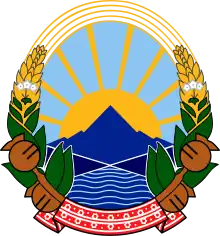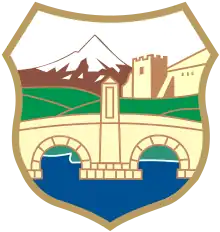The following is a timeline of the history of the city of Skopje, North Macedonia.[nb 1]
Prior to 20th century
- 6th C. CE - Skopje Fortress built.
- 518 CE - Earthquake.[1]
- 6th C. CE - Town rebuilt; called "Justiniana Prima."[2]
- 7th C. CE - Slavs in power.[2]
- 8th - 12th C. - Lot of Bulgarian rulers are missing. The city was capital of Bulgaria. Byzantine rule is missing. The city was capital of a Byzantine province called Bulgaria?!?
- 1282 - Serbs in power.[3]
- 1346
- Coronation of Stephen Uroš IV Dušan as Emperor of the Serbs.[4][5]
- Town becomes capital of the Serbian Empire.
- Marko's Monastery established near town.
- 1366 - Serbian Vukašin Mrnjavčević in power.[3]
- 1391 - Ottomans in power; town renamed "Üsküp" and becomes capital of the Ottoman Sanjak of Üsküb.[3]
- 1392 - Pasha Yigit-Beg becomes governor of the Sanjak of Üsküb.[2]
- 1415 - Ishak Bey becomes governor of the Sanjak of Üsküb.
- 1436 - Sultan Murad Mosque built.[2]
- 1443 - Islamic library established.[6]
- 1454 - Isa-Beg Isaković becomes governor of the Sanjak of Üsküb.
- 1465 - Madrasa of Ishak Beg established.[6]
- 1467 - Kapan Han (caravanserai) active (approximate date).
- 1469 - Stone Bridge built.
- 1476 - Mosque of Isa Bey built.[2]
- 1485 - Kodja Mustafa mosque built.[2]
- 1492 - Mustafa Pasha Mosque built[6] in the bazaar.
- 1495 - Karlozade mosque built.[2]
- 1503 - Mosque of Yahya Pasha built.[2]
- 1519 - Aladja Mosque built.[6]
- 1555 - 1555 Skopje earthquake
- 1569 - Population: 10,525.
- 1572 - Political unrest.[3]
- 1584 - Political unrest.[3]
- 1595 - Political unrest.[3]
- 1661 - Traveller Evliya Çelebi visits town.[2]
- 1689 - October: Fire of Skopje 1689.[2]
- 1803 - Mosque of Murat Pasha built.
- 1868 - Town becomes part of the Ottoman Prizren Vilayet.
- 1873 - Thessaloniki–Skopje railway begins operating.[2]
- 1875 - Seat of the Prizren Vilayet relocated to Uskub from Pristina.[2]
- 1877 - Town becomes part of the Ottoman Kosovo Vilayet.
- 1882 - Population: 34,152.
- 1888 - Belgrad-Nish-Skoplye railway begins operating.[2]
20th century
- 1905 - Population: about 32,000.[1]
- 1912
- August: Albanians in power.
- Spiro Hadzhi Ristic becomes mayor.
- 1913 - Serbs in power[4] per Treaty of London.
- 1918 - Town becomes part of Kingdom of Serbs, Croats and Slovenes.[2]
- 1921 - Population: 32,249.[2]
- 1926 - Skopje Zoo opens.
- 1928 - Skopje International Airport opens
- 1929 - Josif Mihajlović becomes mayor.
- 1931 - Population: 64,807.[2]
- 1936 - Freedom Bridge built.
- 1941
- April: City taken by German forces.[7]
- Spiro Kitinchev becomes mayor.
- 1944
- 1945 - City becomes capital of the Socialist Republic of Macedonia of Yugoslavia.[3]
- 1946
- Saints Cyril and Methodius University of Skopje established.
- Association of Journalists of Macedonia headquartered in city.[11]
- 1947 - City Stadium of Skopje opens.
- 1949
- City becomes capital of Skoplje Oblast.[4]
- Museum of the City of Skopje founded in a former railway station.
- Ss. Cyril and Methodius University of Skopje founded.
- 1953 - Population: 121,551.[12]
- 1963
- 26 July: 1963 Skopje earthquake.
- Revolution Bridge built.
- Contemporary Art Museum of Macedonia founded.
- 1967 - Macedonian Academy of Sciences and Arts headquartered in city.
- 1974 - Metodi Antonov becomes mayor.
- 1976 - City administration organized into five municipalities: Čair, Centar, Gazi Baba, Karpoš, and Kisela Voda.
- 1977 - Cathedral of the Sacred Heart of Jesus founded.
- 1978 - Tumba Madžari archaeological excavations begin.
- 1981
- Transportation Center Skopje rebuilding completed.
- Population: 408,143.[13]
- 1984 - Macedonian Radio-Television Center built.
- 1986 - Jugoslav Todorovski becomes mayor.
- 1990 - Church of St. Clement of Ohrid consecrated.
- 1991 - Milan Talevski becomes mayor.
- 1992 - July: Political demonstration.[14]
- 1993
- City becomes capital of the Republic of Macedonia.[3]
- Library of Islamic Culture built.[15]
- United States Army Camp Able Sentry established near city.
- 1995 - Macedonian Stock Exchange established.
- 1996
- City administration organized into seven municipalities: Čair, Centar, Gazi Baba, Gjorče Petrov, Karpoš, Kisela Voda, Šuto Orizari.
- Yahya Kemal College established.
- Risto Penov becomes mayor.
- 1997 - Center for Strategic Research and Documentation founded.[16]
- 1998 - Albanian demonstration.[17]
- 1999 - Euro-Balkan Institute headquartered in city.[16]
21st century
- 2001
- May: Political unrest.[17]
- June: Anti-NATO demonstration.[18]
- July: Anti-NATO demonstration.[19]
- August: Protest against Ohrid Agreement.[20]
- 2002
- May: Labour unrest.[21]
- Population: 506,926; metro 668,518.
- 2004
- City administration organized into ten municipalities: Aerodrom, Butel, Čair, Centar, Gazi Baba, Ǵorče Petrov, Karpoš, Kisela Voda, Saraj, Šuto Orizari.
- Press to Exit project space established.[22]
- 2005
- Dance Fest Skopje begins.
- Trifun Kostovski becomes mayor.
- 2009
- Memorial House of Mother Teresa opens.
- Koce Trajanovski becomes mayor.
- 2010 - Skopje 2014 construction project announced.
- 2011
- Skopje Airport new terminal and Museum of the Macedonian Struggle open.
- Millennium Cross Cable Car begins operating.
- Statue of Alexander the Great unveiled in Macedonia Square.[23]
- Cevahir Towers construction begins.
- 2012 - March: Ethnic unrest.[17]
- 2013
- March: Ethnic unrest.[24]
- Air pollution in Skopje reaches annual mean of 45 PM2.5 and 74 PM10, more than recommended.[25]
- 2014 - Skopje 2014 extensive re-building project.
- 2016
See also
Notes
- ↑ The city of Skopje has been known by several names: Iskubia, Scopia, Scupi, Skopia, Skopie, Skopje, Skoplje, Skoplye, Uscub, Uscup, Ushküp, Uskiup, Üsküb, Usküp. See also: Other names of Skopje.
References
- 1 2 Britannica 1910.
- 1 2 3 4 5 6 7 8 9 10 11 12 13 14 15 16 Bajraktarević 1936.
- 1 2 3 4 5 6 7 8 Van Vynckt 1996.
- 1 2 3 Leon E. Seltzer, ed. (1952), Columbia Lippincott Gazetteer of the World, New York: Columbia University Press, p. 1781, OL 6112221M
- ↑ Ferdinand Schevill (1922), History of the Balkan Peninsula, New York: Harcourt, Brace, OL 23304265M
- 1 2 3 4 H.T. Norris (1993), Islam in the Balkans, Columbia, S.C: University of South Carolina Press, ISBN 978-0872499775
- ↑ Webster's Geographical Dictionary, Springfield, Massachusetts, USA: G. & C. Merriam Co., 1960, p. 1052, OCLC 3832886, OL 5812502M
- ↑ Crawford, Steve. The Eastern Front Day by Day, 1941-45: A Photographic Chronology, Potomac Books, 2006, ISBN 1597970107, p. 170: "November 13, 1944: Greece, land war. The Bulgarian First Army ejects Army Group E from Skopje although, as most Axis forces have left Greece, this does not trap the army group."
- ↑ Stone & Ston; An online database of World War II, books and information on the Web since 1995: War Diary for Monday, 13 November 1944: "German forces withdraw from Skopje as Bulgarian 1st Army advances. Bulgarian 1st Army captures Skopje. Southern flank of the Russian Front, 1944-1945; Balkan campaigns, the Aegean, and the Adriatic, 1942-1945."
- ↑ "Global Resources Network". Chicago, USA: Center for Research Libraries. Retrieved 29 December 2013.
- ↑ "Members". Global Investigative Journalism Network. Retrieved 29 December 2013.
- ↑ "Population of capital city and cities of 100,000 or more inhabitants". Demographic Yearbook 1955. New York: Statistical Office of the United Nations.
- ↑ United Nations Department of Economic and Social Affairs, Statistical Office (1987). "Population of capital cities and cities of 100,000 and more inhabitants". 1985 Demographic Yearbook. New York. pp. 247–289.
{{cite book}}: CS1 maint: location missing publisher (link) - ↑ "Former Yugoslav Republic of Macedonia". Europa World Year Book 2004. Taylor & Francis. 2004. ISBN 978-1857432534.
- ↑ ArchNet.org. "Skopje". Cambridge, Massachusetts, USA: MIT School of Architecture and Planning. Archived from the original on 30 December 2013. Retrieved 29 December 2013.
- 1 2 "Think Tank Directory". Philadelphia, USA: Foreign Policy Research Institute. Archived from the original on 10 November 2013. Retrieved 28 December 2013.
- 1 2 3 "Macedonia Profile: Timeline". BBC News. 29 March 2012. Retrieved 29 December 2013.
- ↑ "U.S. Wades Into Macedonian Conflict and Skopje Erupts". New York Times. 25 June 2001.
- ↑ "Mobs Protest In Macedonia". New York Times. 25 July 2001.
- ↑ "Violence on Both Sides in Macedonia Mars Peace Accord". New York Times. 10 August 2001.
- ↑ "Global Nonviolent Action Database". Pennsylvania, USA: Swarthmore College. Retrieved 29 December 2013.
- ↑ "Macedonia". Art Spaces Directory. New York: New Museum. Retrieved 29 December 2013.
- ↑ "Skopje Journal: Weary of Greek Pressure, Macedonia Claims a Hero". New York Times. 4 July 2011.
- ↑ "Ethnic Albanians clash with police in Macedonia". Reuters. 2 March 2013.
- ↑ World Health Organization (2016), Global Urban Ambient Air Pollution Database, Geneva, archived from the original on 28 March 2014
{{citation}}: CS1 maint: location missing publisher (link) - ↑ "Macedonia's protests try to bring down government with a splat", BBC News, 8 June 2016
This article incorporates information from the French Wikipedia and Macedonian Wikipedia.
Bibliography
- Edward Brown (1673). "Skopia". A Brief Account of Some Travels in Hungaria, Servia, Bulgaria, Macedonia, Thessaly, Austria, Styria, Carinthia, Carniola, and Friuli. London: Benj. Tooke.
- A.J. Evans (1885), "Scupi, Skopia, and the Birthplace of Justinian", Antiquarian Researches in Illyricum, vol. 3–4, England: Nichols & Sons, pp. 79–152, hdl:2027/pst.000006247065
- . Encyclopædia Britannica. Vol. 27 (11th ed.). 1910. p. 811.
- Anthony Lawrence Gancevic (1913). "Archdiocese of Scopia". Catholic Encyclopedia. New York.
{{cite book}}: CS1 maint: location missing publisher (link) - Fehim Bajraktarević (1936). "Üsküb". Encyclopaedia of Islam. E.J. Brill. p. 1052+. ISBN 9789004097940.
- Randall J. Van Vynckt (1996). "Skopje". In Trudy Ring (ed.). Southern Europe. International Dictionary of Historic Places. Vol. 3. Fitzroy Dearborn. OCLC 31045650.
- S. Bouzarovski (2011). "Skopje" (PDF). Cities. 28 (3): 265–277. doi:10.1016/j.cities.2010.05.002.
- Roman A. Cybriwsky (2013). "Skopje". Capital Cities around the World: An Encyclopedia of Geography, History, and Culture. ABC-CLIO. p. 281+. ISBN 978-1-61069-248-9.
External links
Wikimedia Commons has media related to History of Skopje.
- Europeana. Items related to Skopje, various dates.
This article is issued from Wikipedia. The text is licensed under Creative Commons - Attribution - Sharealike. Additional terms may apply for the media files.

